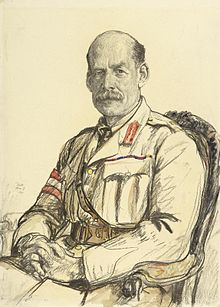Arthur Holland (British Army officer)
British Army general and politician (1862–1927) From Wikipedia, the free encyclopedia
Lieutenant General Sir Arthur Edward Aveling Holland, KCB, KCMG, DSO, MVO (13 April 1862 – 7 December 1927) was a British Army officer and Conservative and Unionist politician.
Sir Arthur Holland | |
|---|---|
 1917 portrait by Francis Dodd | |
| Birth name | Arthur Edward Aveling Butcher |
| Born | 13 April 1862 Kent, England[1] |
| Died | 7 December 1927 (aged 65) |
| Allegiance | United Kingdom |
| Service | British Army |
| Years of service | 1880–1920 |
| Rank | Lieutenant General |
| Commands | I Corps 1st Division Royal Military Academy, Woolwich |
| Battles / wars | First World War |
| Awards | Knight Commander of the Order of the Bath Knight Commander of the Order of St Michael and St George Distinguished Service Order Member of the Royal Victorian Order Mentioned in Despatches Legion of Honour[2] |
Military career
Summarize
Perspective

Born the son of Major General Butcher, Butcher changed his surname to Holland in 1910.[3] Holland was, after graduating from the Royal Military Academy at Woolwich, commissioned into the Royal Artillery in May 1880.[4][5] He was promoted to captain in November 1888.[6]
After being promoted to major on augmentation in July 1898,[7] he served in the Second Boer War and then became assistant military secretary to the governor and commander-in-chief of Malta in 1903. He was promoted to lieutenant colonel in November 1905[8] and to brevet colonel in November 1908.[9]
He later served at the War Office from January 1910 as an assistant military secretary,[4][10] and was promoted to colonel on the same date.[11] In September 1912 he was appointed commandant of the Royal Military Academy, Woolwich,[12] for which he was later promoted to the temporary rank of brigadier general in January 1913.[13]
He also served in the First World War, which began in the summer of 1914, becoming brigadier general, Royal Artillery of the 8th Division,[14] in which capacity he took part in the Battle of Neuve Chapelle in March 1915.[3] In June he was made a CB.[15] In July he became BGRA for VII Corps but was only there briefly as in September, after being promoted to the temporary rank of major general,[16] he succeeded Major General Richard Haking as general officer commanding of the 1st Division.[3] His major general's rank having been made substantive in January 1916,[17] he led his division in 1916, although not in any major actions, and continued his war service as major general, Royal Artillery for General Sir Edmund Allenby's Third Army from June 1916.[18] He became GOC of I Corps from February 1917, upon being made a temporary lieutenant general, and which he commanded for the remainder of the war.[19]
He became colonel commandant of the Royal Artillery in October 1919.[20] He retired from the army in March 1920,[21] after his rank of lieutenant-general was made permanent.[4][22]
Member of Parliament
Holland was Member of Parliament for Northampton from 1924 until his death in 1927.[4] The consequent by-election for his seat was won by the Labour candidate Cecil Malone.
Family
Arthur Holland married Mary Kate Duval; they had one daughter.[3] He died in 1927 and was interred in Greenwich Cemetery.[23]
References
External links
Wikiwand - on
Seamless Wikipedia browsing. On steroids.
